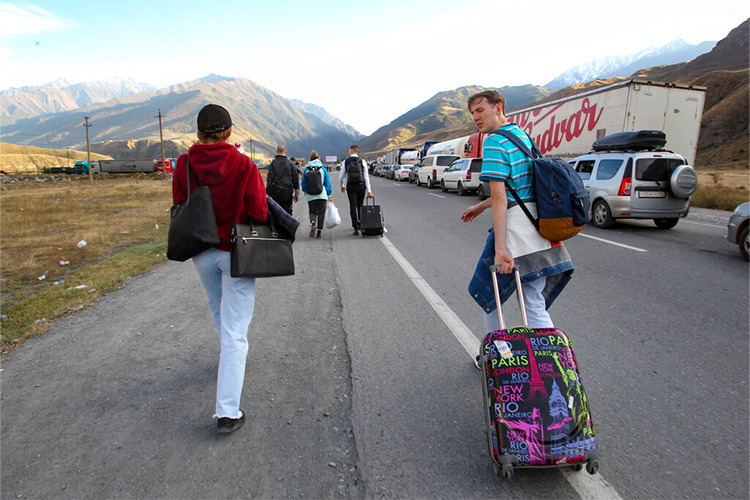
Thousands of people flee Russia to escape Putin’s draft. photo courtesy of the Associated Press
Ukrainians are not the only ones being impacted by Russia’s mobilization – the Russian population feels the effects as well.
It seemed like sirens went off in the heads of many Americans when Russia launched its invasion of Ukraine last February. The impending threat of nuclear warfare occupied anxious minds across America, serving as a reminder of our country’s complex history with Russia. News coverage ran rampant as our daily lives began to feel like a sequel to the Cold War.
Fast forward approximately half a year and the statistics of the war reveal that Western involvement is still essential to the success of Ukraine. There are 6.6 million Ukrainian refugees and counting. There are tens of thousands of Ukrainians believed to be dead. There are possibly 200 billion dollars in Ukrainian damages. There are approximately 9,000 Ukrainian Military casualties and 25,000 Russian Military casualties. Despite the damage, there are no signs that Russian leader, Vladmir Putin, will abandon the invasion of his most unfortunate neighbors. In recent months, he has alluded to nations across the globe that any country who is to interfere with Russia’s goal to overthrow Kyiv will face Moscow’s nuclear arsenal. Not just any nuclear arsenal, but the world’s largest sitting at 6,850 weapons. This extreme display of military power begs the question: How does the Russian population feel about Putin’s choices? From the countries’ 144 million people, at least 20% admitted to disagreeing with Putin’s actions in Ukraine. Russian’s approval of Vladimir Putin is not likely to get any better after one of his country’s most recent decisions. Towards the end of September, Russian Defense Minister, Sergei Shoigu declared the country would begin the process of drafting 300,000 reservists back into the military to fight in Ukraine. However, controversy in Russia has sparked because of civilian reports exposing unsuitable civilian candidates receiving draft notices. These reports include evidence of old, sick, and untrained men being conscripted. Many of these unsuitable candidates are now being forced to decide between fleeing the country or risk dying in a war they may not support. By the end of last month, Defense Minister Shoigu announced that 200,000 Russian men had already been conscripted into the army. This number has already been surpassed by an estimate of 400,000 Russians that have fled into neighboring countries; a number that is likely far greater when accounting for the former USSR countries withholding their immigration statistics.
Although many different men have been forced to flee, their paths towards freedom are all unique. The countries they end up in and the transportation they utilize to get there varies person to person. Umaraskhab, a muslim man who was born and raised in the Republic of Dagestan, shared with Politico magazine his reasons for leaving Russia. Daegastan is a region in the North Caucasus on the Southwestern border of Russia, a place with wide racial diversity. In 2000, Umaraskhab joined the Russian military where he experienced this racism first hand. In his interview, Umaraskhab claimed that the Russian government is disproportionately recruiting out of Dagestan due to racial discrimination. He said that recruitment offices round up and deceive Dagestani men into signing recruitment papers that turn their lives over to the army. Umaraskhab cannot resist seeing these actions as government employed tactics used to oppress and control the Caucasus region. Mikhail is another Russian man who voiced his opinions on conscription to the public. He is a 39 year-old living in Yakutsk, a city in the Sakha Republic of Russia. Mikhail is diagnosed with high blood pressure, which excused him from military service after leaving college. However, he was forced into a state of constant anxiety when he heard that men from Yakutsk were being drafted regardless of their health status. Mikail revealed to Politico Magazine that he had purchased a plane ticket out of the country upon hearing about the draft. Unfortunately, he later realized that he could not gamble his chances on a life of poverty as an immigrant. After refunding his ticket, Mikail now has had to come to terms with his choice. He claims that if he is to get drafted he will refuse to fight in the war. Mikail says he would rather go to prison than war. There is seldom a positive outcome for these Russian men. The effects of this war now span further than just within the borders of Ukraine. It is important to acknowledge that no one is safe from this war until everyone affected has been helped. Remember, nuclear weapons know no bounds.